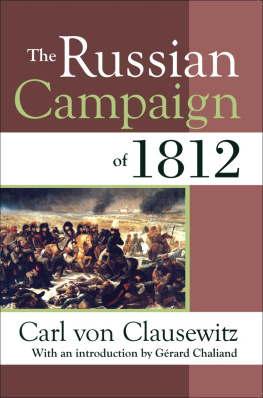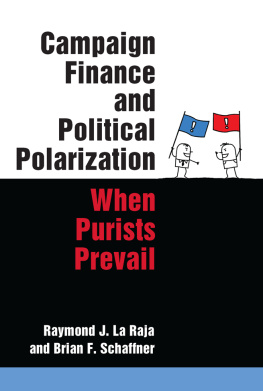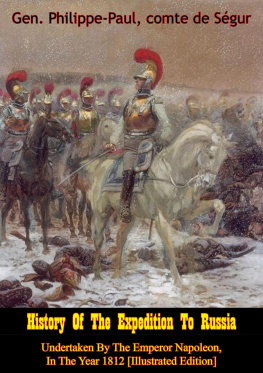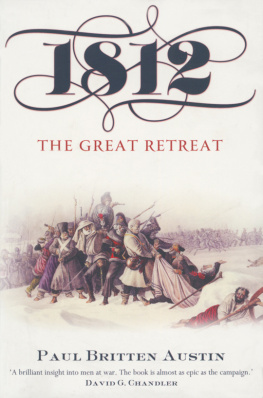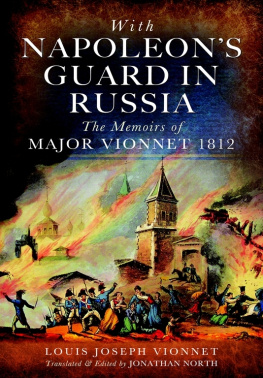A JOURNAL OF THE RUSSIAN CAMPAIGN OF 1812.
TRANSLATED FROM THE FRENCH OF
LIEUT.-GENERAL DE FEZENSAC,
WITH AN INTRODUCTORY NOTICE ON SOME PASSAGES
CONNECTED WITH THE CAMPAIGN,
BY COLONEL W. KNOLLYS,
SCOTS FUSILIER GUARDS.
This edition is published by PICKLE PARTNERS PUBLISHING
Text originally published in 1852 under the same title.
Pickle Partners Publishing 2011, all rights reserved. No part of this publication may be reproduced, stored in a retrieval system or transmitted by any means, electrical, mechanical or otherwise without the written permission of the copyright holder.
Publishers Note
Although in most cases we have retained the Authors original spelling and grammar to authentically reproduce the work of the Author and the original intent of such material, some additional notes and clarifications have been added for the modern readers benefit.
DEDICATION TO FIELD MARSHAL HIS ROYAL HIGHNESS THE PRINCE ALBERT, K.G.
ETC. ETC. ETC.
SIR,
I presume to lay before your Royal Highness, as Colonel of Her Majestys Scots Fusilier Regiment of Guards, the translation of a work undertaken with the sole view of giving it a place in the non-commissioned officers and privates libraries of your Royal Highnesss Regiment.
The Journal of the Campaign in Russia of 1812 appeared to the translator the record of a good soldiers duties and a good mans feelings. As such, he thought it might not unprofitably beguile a vacant hour in the barrack-room, and it is possible that he may have extended the circle of his readers by the Introduction which he has been led by the interest of the subject to prefix.
In the honourable post of Lieutenant-Colonel of your Royal Highnesss Regiment, the translator has had opportunities of becoming acquainted with the unceasing interest your Royal Highness takes in the instruction and amusement of all ranks composing it. Should either be in any degree afforded by the work as it now stands, he persuades himself that it will meet with the gracious approbation of your Royal Highness.
With the greatest respect,
Your Royal Highnesss
Most dutiful and obedient servant, W. KNOLLYS, Col.,
Lieut.-Col. Com. Scots Fus. Guards
Introduction
To others fatal, for him immortal Such are the words applied by the Count Philip de Segur, author of the History of Napoleon and the Grand Army , to the commander of the 3rd corps, on the occasion of its memorable retreat from Moscow. The military reader needs scarcely be told that the commander was Marshal Ney, and the corps that which formed the rear-guard of the French army during the most critical portion of the retreat. Even now, forty years from the event, who can fail to have his interest re-awakened, his sympathies reenlisted, by an additional versionanother perusal of sufferings, losses, and, let us add, courage, which have never been surpassed military annals? We shall find instances of endurance and despair, heroism and timidity, self-devotion and selfishness, that will point the moral of a tale, drawing upon the liveliest feelings of our nature. Our imagination recoils at the fearful reality of the relation: we fancy ourselves wandering in the regions of romance; and it is not until some stubborn row of figures recalls us to facts, that we can persuade ourselves that we are reading an ower true tale. To the soldier, however, more than to any other class, must this tale come home.
While yet in his barrack-room he may study a lesson he knows not how soon he may be called on to practise in the field; may read a page which will excite his ambitionthe ambition of emulating qualities such as procured the leader of the 3rd corps the admiration of all who followed him.
And let not our military friend, if of humble rank, imagine that the lesson concerns him not, that it is only one for those above his degree. Courage and energy in encountering difficulties, cheerfulness and firmness in enduring hardships, are common properties with the general and private soldiertheir common bond of union and strength, equally necessary in carrying both creditably through their common profession. The instance before us will have an additional attraction, in consequence of Marshal Ney having commenced his career as a private soldier; he ended it as Prince de la Moskowaa title his prowess gained for him at the battle thus distinguished by the Frenchby the Russians and English as the battle of Borodino. But on all occasions, wherever the fire was hottest, there was Marshal Ney to be found. Napoleon described him as having a soul tempered with steel, and he was designated by his fellow-soldiers as the bravest of the brave The confidence of those under his command in him was unbounded, At Lutzen, in 1813, where a large proportion of the French soldiers consisted of conscripts, Ney thus addressed Napoleon: Only let me have, Sire, some of these gallant young conscripts, and I will lead them wherever you may think proper. Our old hands are getting too knowing, and pretend to form an opinion of difficulties and positions, but these brave lads can be deterred by no obstaclethey look neither to the right nor left, but only to their front, It is glory alone they seek M. de Fezensac tells us that death on the field of battle was, in the Marshals opinion, all that was worth a soldiers living for. Alas for his memory, that he had not himself met this fate where he had so often courted it, and thus avoided the ignominious end which awaited him in the gardens of the Luxembourg, at Gumbinnen, that he, Ney, then constituted the rear-guard of the French army. The Marshal had entered the Generals apartments with such haggard looks, and with features so begrimed with mud and gunpowder, as not to be recognised. Do you not know me! he continued; I am Marshal Ney; I have fired the last shot at Kowno, and thrown into the Niemen the last of the French army But the interest attending the campaign of Moscow will not be confined to military readers; although its operations and details are open to a more searching criticism from this class, a picture presenting such strong lights and shades of human character, such dark and bright sides of human nature, cannot be passed by with indifference by the general reader. He will in these days have the advantage of seeing it discussed and criticized with a moderation and temper which the personal and national hostility of the time was fatal to. As English we claim to be admitted as impartial umpires. In the progress or issue of the campaign we have no wounded feelings to smart under, no mortified pride to be soothed. At its most critical juncture we were fighting with success our own battles in another region; and at any time in 1812 that Napoleon had chosen to make peace with Russia, we should again have had to contend with him single-handed.
We may regard it then, solely as a military professional question, calculated to afford us instruction, and therefore worthy of a close investigation. The considerations which led Napoleon to undertake this gigantic enterprise, when he had nearly the whole of Europe at his feet ----his preliminary intrigues with Russiathe infatuation of the Emperor Alexander for the French ruler, and subsequent recovery from his fascinationthe tortuous conduct of Austria and Prussiatheir defection from Napoleons causetheir struggles to escape the toils which his policy had woven round them,on these points our reader will seek for information from some political historian, the Macaulay or Alison of the day. But there are other subjects to be elucidated of a military nature, involving doubts and difficulties which he will be unable satisfactorily to resolve without the aid of a military writer. For these he will probably prefer turning to some contemporaneous narrator; one who formed part of the expedition, and was an eye-witness, was present himself at the great battle under the walls of Moscow, and therefore better authority than he who had gathered his information second-hand. He will endeavour to clear, with this guide, the still debatable ground, and the field of interest will widen upon him as he pursues his inquiry.




